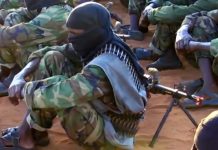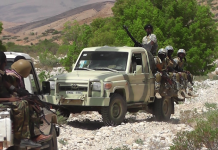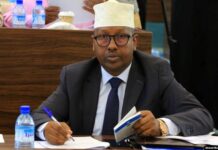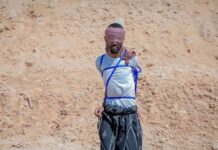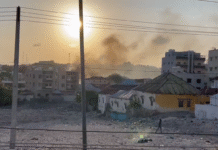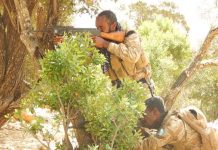Awil Dihar Salad knew firsthand the dangers of practicing journalism in Somalia. The veteran reporter had spent years working there, but he fled the Horn of Africa nation in 2005, fearing he could be targeted.
When he finally returned, he hosted a popular talk show on Universal TV.
But despite his precautions, Salad was killed Saturday in a bomb attack near the presidential palace in the Somali capital of Mogadishu. His driver and two of his security guards were among the at least 16 others killed in the attack. At least 20 people were injured, the Associated Press reported.
The Committee to Protect Journalists describes Somalia as a very dangerous places for journalists. Since the advocacy organization began counting journalist deaths in 1992, it has recorded at least 65 confirmed cases of journalist killings there, according to Angela Quintal, its Africa program coordinator.
The CPJ reported this week that worldwide, 53 journalists were killed between Jan. 1 and Dec. 14, 2018. Thirty-four were “singled out for murder,” nearly doubling the number killed in reprisal attacks last year. Among them was Somali radio journalist Abdullahi Mire Hashi, who was killed in October when men opened fire on him near his mosque. He had allegedly been intimidated with anonymous phone calls and faced questions for why his radio program did not focus on al-Shabab, an Islamist militant group.
Quintal said her organization is also investigating two additional journalist deaths that occurred in Somalia in 2018, as well as the deaths of Salad and his three colleagues Saturday. Another journalist recently survived a car-bomb attack, the CPJ said.
It’s not yet clear whether Salad was specifically targeted in this attack. Al-Shabab, which controls parts of Somalia, took responsibility for the two blasts.
For years, the militants, who once controlled much of the capital, have struggled against the Somali government to establish a harsh version of sharia law. They often carry out deadly bomb attacks in Mogadishu. In 2017, the group killed more than 500 people in a truck bombing there.
The United States recently took credit for killing 62 al-Shabab fighters in airstrikes on Dec. 15 and 16. Around 500 U.S. troops are stationed in Somalia. Two have died there since President Trump took office. Around 20,000 troops from other countries in the region are part of an African Union mission also deployed to the country.
Somalia has a long history of impunity for journalist deaths.
“In terms of journalists killed in direct reprisal for their work, Somalia tops our Global Impunity Index for the number of journalists murdered and their killers walk free,” Quintal told The Washington Post.
Earlier this year, after a cameraman was shot dead in Mogadishu, the CPJ urged Somali authorities to investigate his killing. “Dozens of unsolved killings of journalists are a grave reminder of the dangers facing the press in Somalia,” Quintal said at the time. “The police should be working to ensure the media are able to do their job without fear, not adding to the dangers they face.”
A friend who spoke on the condition of anonymity said Salad was “a great guy, very sociable,” who connected journalists to one another. “He was well-known, easygoing and used to avoid associating himself with controversies,” he said.
The friend said that Salad worked for multiple radio stations over his career and wrote “short stories about love and life” that were published in Mogadishu newspapers. Salad kept track of his colleagues, sharing information when they fell ill or encountered a problem.
Since Salad started in journalism decades ago, the community has buried many of its own.
“We have lost far too many good people,” his friend said.
Source: Washintonpost

